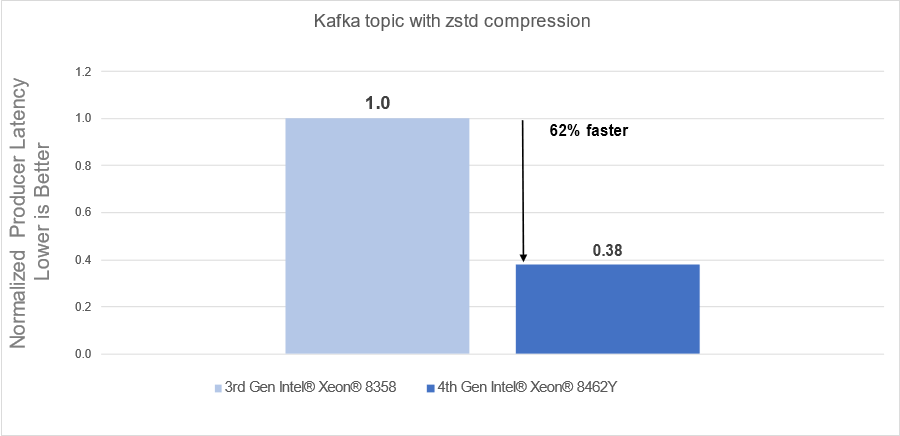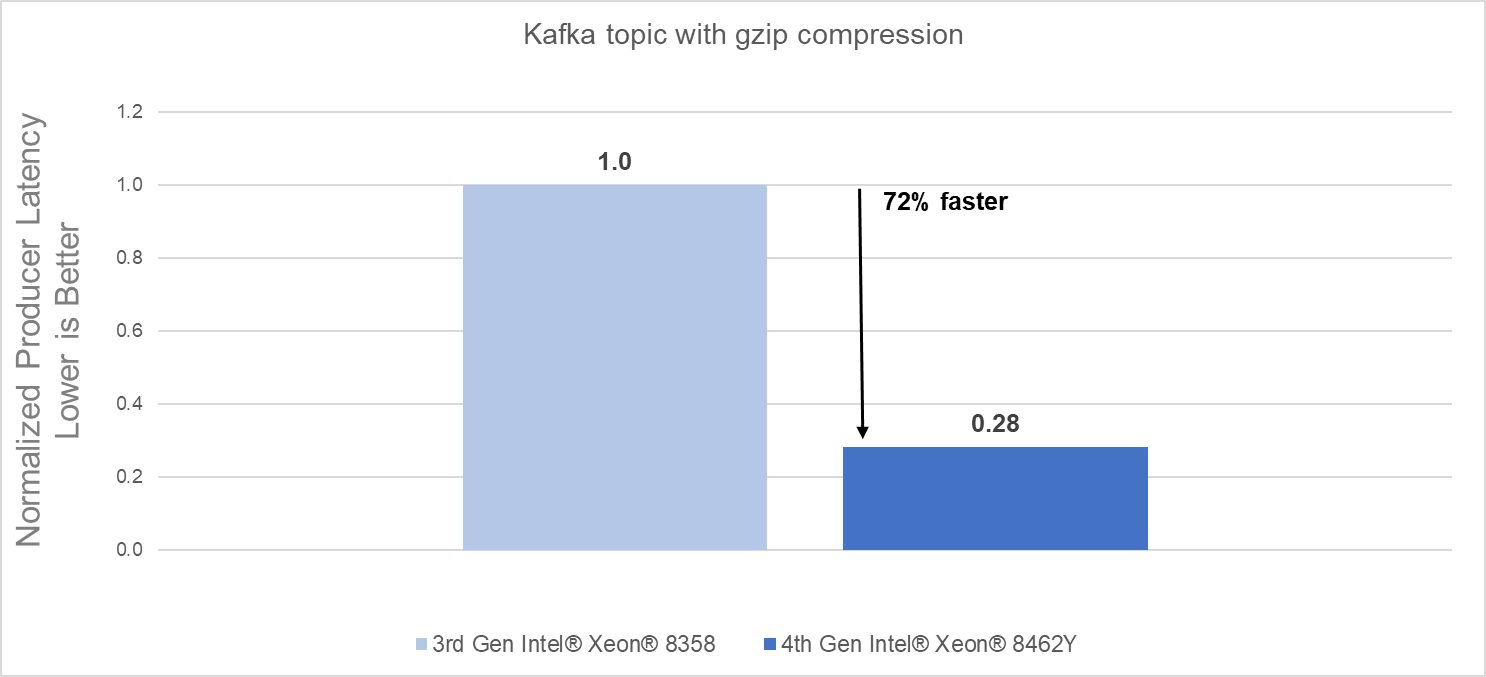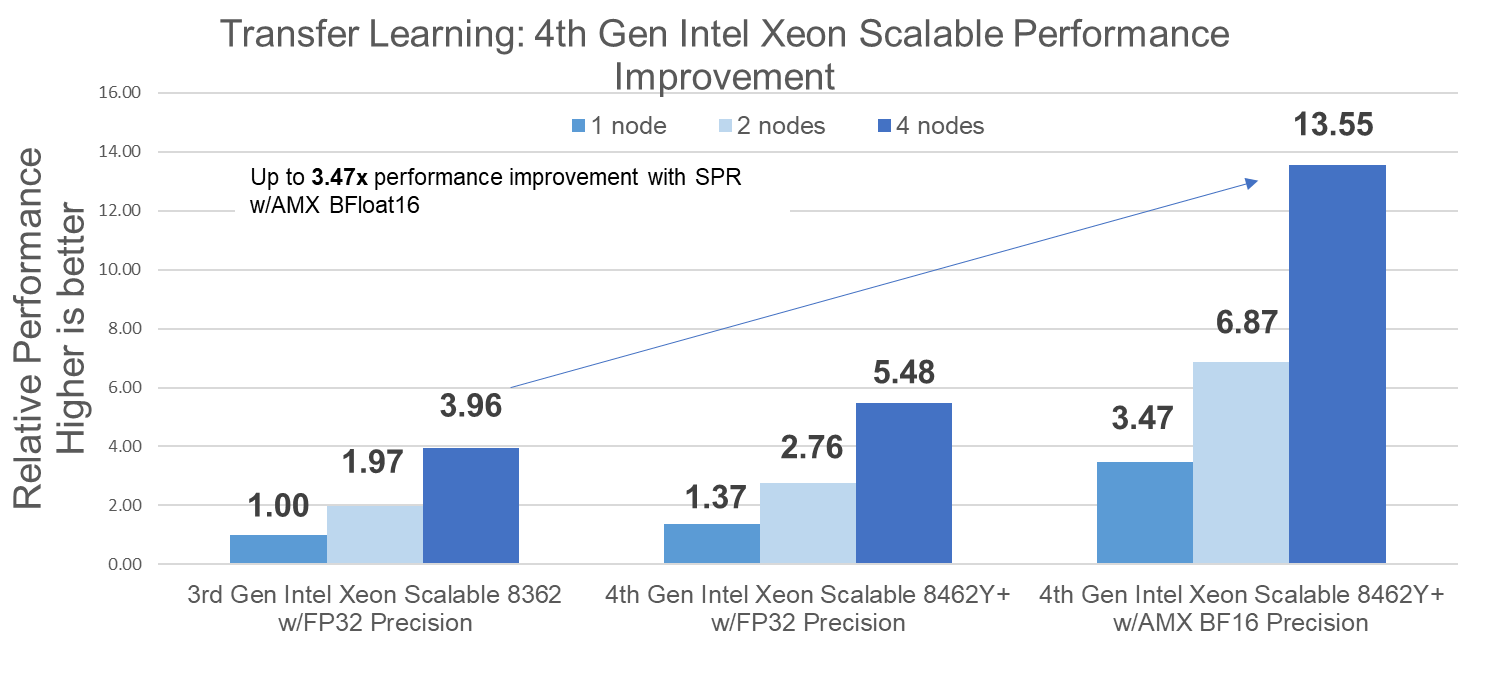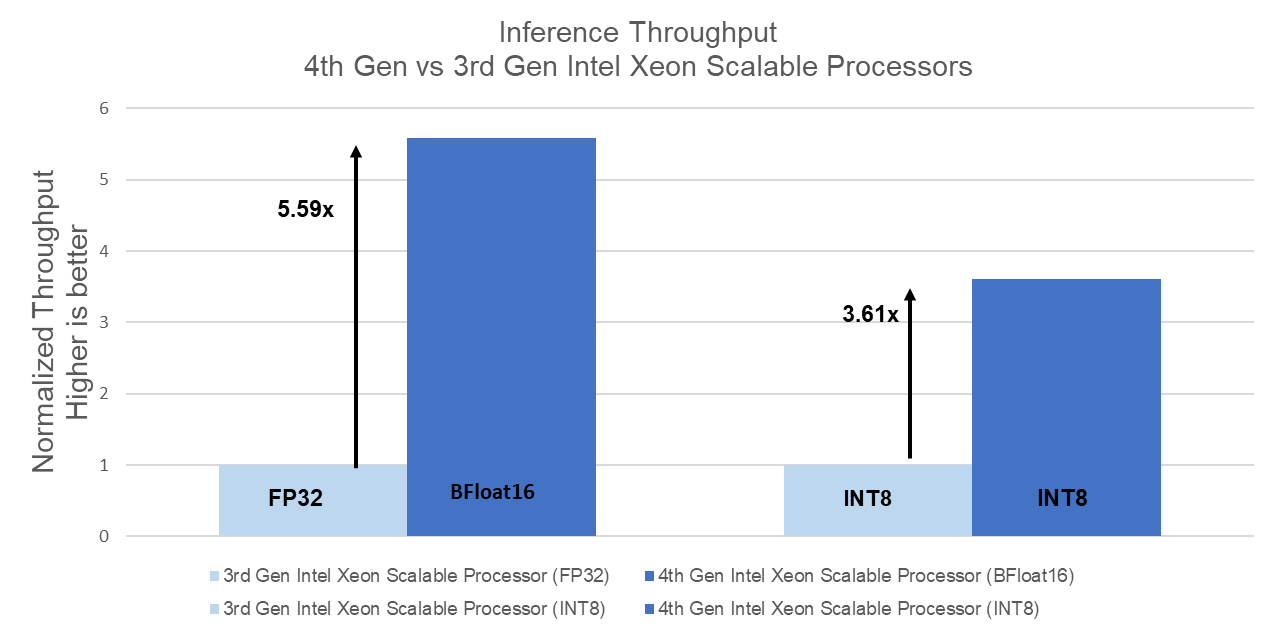

Powering Kafka with Kubernetes and Dell PowerEdge Servers with Intel® Processors
Dell DfD Kafka SPR Dell DfD Kafka ICX Dell DfD Kafka Kubernetes Test ReportMon, 29 Jan 2024 23:33:38 -0000
|Read Time: 0 minutes
Kafka with Kubernetes
At the top of this webpage are 3 PDF files outlining test results and reference configurations for Dell PowerEdge servers using both the 3rd Generation Intel® Xeon® processors and 4th Generation Intel Xeon processors. All testing was conducted in Dell Labs by Intel and Dell Engineers in October and November of 2023.
- “Dell DfD Kafka ICX” – highlights the recommended configurations for Dell PowerEdge servers using 3rd generation Intel® Xeon® processors.
- “Dell DfD Kafka SPR” – highlights the recommended configurations for Dell PowerEdge servers using 4th generation Intel® Xeon® processors.
- “Dell DfD Kafka Kubernetes Test Report” – Highlights the results of performance testing on both configurations with comparisons that demonstrate the performance differences between them.
Solution Overview
The Apache® Software Foundation developed Kafka as an Open Source solution to provide distributed event store and stream processing capabilities. Apache Kafka uses a publish-subscribe model to enable efficient data sharing across multiple applications. Applications can publish messages to a pool of message brokers, which subsequently distribute the data to multiple subscriber applications in real time.
Kafka is often deployed for mission-critical applications and streaming analytics along with other use cases. These types of workloads require leading-edge performance which places significant demand on hardware.
There are five major APIs in Kafka[i]:
- Producer API – Permits an application to publish streams of records.
- Consumer API – Permits an application to subscribe to topics and process streams of records.
- Connect API – performs the reusable producer and consumer APIs that can link the topics to the existing applications.
- Streams API – This API converts the input streams to output and produces the result.
- Admin API – Used to manage Kafka topics, brokers, and other Kafka objects.
Kafka with Dell PowerEdge and Intel processor benefits
The introduction of new server technologies allows customers to deploy solutions using the newly introduced functionality, but it can also provide an opportunity for them to review their current infrastructure and determine if the new technology might increase performance and efficiency. Dell and Intel recently conducted testing of Kafka performance in a Kubernetes environment and measured the performance of two different compression engines on the new Dell PowerEdge R760 with 4th generation Intel® Xeon® Scalable processors and compared the results to the same solution running on the previous generation R750 with 3rd generation Intel® Xeon® Scalable processors to determine if customers could benefit from a transition.
Some of the key changes incorporated into 4th generation Intel® Xeon® Scalable processors include:
- Quick Assist Technology (QAT) to accelerate data compression and encryption.
- Support for 4800 MT/s DDR5 memory
Raw performance: As noted in the report, our tests showed a 72% producers’ latency decrease with gzip compression and a 62% producers’ latency decrease with zstd compression.


Conclusion
Choosing the right combination of Server and Processor can increase performance and reduce time, allowing customers to react faster and process more data. As this testing demonstrated, the Dell PowerEdge R760 with 4th Generation Intel® Xeon® CPUs significantly outperformed the previous generation.
- The Dell PowerEdge R760 with 4th Generation Intel® Xeon® Scalable processors delivered:
- 62% faster processing using zstd compression
- 72% faster procession using gzip compression
- 4th Generation Intel® Xeon® Scalable processors benefits are the results of:
- Innovative CPU microarchitecture providing a performance boost
- Introduction of DDR5 memory support
[i] https://en.wikipedia.org/wiki/Apache_Kafka
Related Documents

Powering AI using Red Hat Openshift with Intel based PowerEdge servers
Fri, 13 Oct 2023 14:42:09 -0000
|Read Time: 0 minutes
End-to-End AI using OpenShift Overview
At the top of this webpage are 3 PDF files outlining test results and reference configurations for Dell PowerEdge servers using both the 3rd Generation Intel® Xeon® processors and the 4th Generation Intel Xeon processors. All testing was conducted in Dell Labs by Intel and Dell Engineers in May and June of 2023.
- “Dell DfD E2E AI ICX” – highlights the recommended configurations for Dell PowerEdge servers using 3rd generation Intel Xeon processors.
- “Dell DfD E2E AI SPR” – highlights the recommended configurations for Dell PowerEdge servers using 4th generation Intel Xeon processors.
- “DfD – PowerEdge E2E AI Test Report” – Highlights the results of performance testing on both configurations with comparisons that demonstrate both performance and reduced power consumption for each.
Solution Overview
Red Hat OpenShift, the industry's leading hybrid cloud application platform powered by Kubernetes, brings together tested and trusted services to reduce the friction of developing, modernizing, deploying, running, and managing applications. OpenShift delivers a consistent experience across public cloud, on-premise, hybrid cloud, or edge architecture.[i]
Companies using OpenShift[ii]
- 50% of Fortune Global 500 aerospace and defense companies.
- 57% of Fortune Global 500 technology companies.
- 51% of Fortune Global 500 financial companies.
- 80% of Fortune Global 500 telecommunications companies.
- 54% of Fortune Global 500 motor vehicles and parts companies.
- 50% of Fortune Global 500 food and drug stores.
Elasticsearch with Dell PowerEdge and Intel processor benefits
The introduction of new server technologies allows customers to deploy solutions using the newly introduced functionality but it can also provide an opportunity for them to review their current infrastructure and determine if the new technology might increase performance and efficiency. With this in mind, Dell and Intel recently conducted Natural Language Processing Artificial Intelligence (AI) performance testing of a RedHat OpenShift solution on the new Dell PowerEdge R760 with 4th generation Intel® Xeon® Scalable processors and compared the results to the same solution running on the previous generation R750 with 3rd generation Intel® Xeon® Scalable processors to determine if customers could benefit from a transition.
Some of the key changes incorporated into 4th generation Intel® Xeon® Scalable processors utilized for this test included:
- New Advanced Matrix Extension (AMX) capabilities
- Improved Advanced Vector Extension (AVX) performance
- The new Intel® Extension for TensorFlow® open-source solution
Raw performance: As noted in the report, our tests showed a 3.47x increase in transfer learning performance and a 5.59x increase in Inferencing Performance


Relative Power Consumption: In addition to higher performance, the R760 based solution also delivered up to 3.39x better performance per watt than the previous generation:

Conclusion
Choosing the right combination of Server and Processor can increase performance and reduce cost. As this testing demonstrated, the Dell PowerEdge R760 with 4th Generation Intel® Xeon® Platinum 8462Y+ CPU’s delivered up to 5.59x more throughput than the Dell PowerEdge R750 with 3rd Generation Intel® Xeon® Platinum 8362 CPU’s and provided up to 3.39x better power efficiency.
Efficient, scalable, and optimized means to run Enterprise AI pipelines on Intel HW; full end-to-end OpenShift stack with Kubeflow
- Up to 3.47x better transfer learning (Fine Tuning) throughput than 3rd Gen Xeon Scalable Processor; with linear scaling on 1, 2, and 4 nodes
- Up to 3.39x higher transfer learning power efficiency than 3rd Gen Xeon Scalable Processor
- Up to 5.59x better performance (inferencing) over 3rd gen Intel Xeon Scalable Processors with FP32 precision using the same core count
- Up to 3.61x performance improvement over 3rd generation Intel® Xeon® Scalable Processors with INT8 precision using same core count
[ii] Source: Fortune 500 subscription data as of 26 September 2022

Powering your Elasticsearch Solution with Dell PowerEdge Servers and Intel® 4th Generation Xeon® Processors
Wed, 02 Aug 2023 16:49:52 -0000
|Read Time: 0 minutes
Summary
This joint paper outlines a brief discussion on the key hardware considerations when configuring a successful deployment and recommends configurations based on Dell 16th Generation PowerEdge servers.
Elasticsearch is a distributed, open-source search and analytics engine for all types of data including textual, numerical, geospatial, structured, and unstructured. This proposal contains recommended configurations for Elasticsearch clusters on the Kubernetes platform (Red Hat OpenShift Container Platform with Elastic Cloud on Kubernetes (ECK) operator) running on 16th Generation Dell PowerEdge servers with 4th Generation Intel Xeon Scalable processors.
Key considerations
- Faster and scalable performance - Elasticsearch running on the latest Dell PowerEdge servers is built on high-performing Intel architecture and configured with 4th Generation Intel Xeon Scalable processors. Indexing is faster and capacity can scale with your needs.
- Better energy and data center space efficient - Running Elasticsearch on the latest generation of PowerEdge servers can save energy and power an even more effective search experience. Moving to the latest generation of PowerEdge servers based on Intel Xeon can help reduce emissions, protect our environment, and reduce operating costs.
- Reduced search times and increased number of concurrent searches - As data grows and needs to be accessed across the cluster, data-access response times are critical, especially for real-time analytics applications. Elasticsearch running on the latest PowerEdge servers is built on high-performing Intel architecture, including Intel Ethernet network controllers, adapters, and accessories to enable agility in the data center and support higher throughput with low latency response times.
- Index more data - Elasticsearch can handle and store more data by increasing DRAM capacity and using PCIe Gen 4 NVMe disk drives. PowerEdge R760 servers are ideally suited to this requirement with memory capacity of up to 8TB and storage expansion of up to 24 high performance NVMe drives.
- Easy and secure installation - The Elastic Cloud on Kubernetes (ECK) operator is an official Elasticsearch operator certified on the Red Hat OpenShift Container Platform, providing ease of deployment, management and operation of Elasticsearch, Kibana, APM Server, Beats, and Enterprise Search on OpenShift clusters. Elasticsearch clusters are secure by default (with enabled encryption and strong passwords).
- Multi Data Tiers - As data grows, costs do not also need to increase. With multiple tiers of data, you can extend capacity and drive storage costs down without performance loss. Each capacity layer can be scaled independently by using larger drives or mode nodes (or both), depending on your needs.
Available configurations
Elasticsearch cluster on Kubernetes (Red Hat OpenShift Kubernetes) platform | ||
| OpenShift Control Plane Master Nodes | Elasticsearch Master / Ingest / Hot tier data nodes |
Functions | OpenShift services, | Elasticsearch roles: |
Platform | Dell PowerEdge R760 chassis with up to 24x2.5” NVMe Direct Drives | |
CPU | 2 x Intel Xeon Gold 6430 processors | 2 x Intel Xeon Platinum 8460Y+ processors |
DRAM | 128GB (16x 8GB DDR5-4400) | 512 GB (16 x 32GB DDR5-4800) |
Boot Device | Dell BOSS-S2 with 2x 240GB or 2x 480GB M.2 SATA SSD (RAID1) | |
Storage adapter | Not needed for all-NVMe configurations | |
Storage (NVMe) | 1x 1.6TB Enterprise NVMe Mixed-Use AG Drive U.2 Gen4 | 2x (up to 24x) 3.2TB Enterprise NVMe Mixed-Use AG Drive U.2 Gen4 |
NIC | Intel E810-CQDA2 for OCP3 (dual-port 100GbE) | |
Learn more
Contact your Dell account team for a customized quote 1-877-289-3355.
Read the doc: What is Elasticsearch?
Read the doc: Data tiers | Elasticsearch Guide
Read the blog: Elastic Cloud on Kubernetes is now a Red Hat OpenShift Certified Operator


